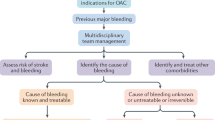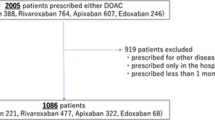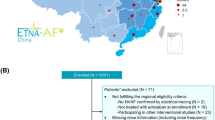Abstract
Warfarin reduces the risk of stroke in atrial fibrillation by around 60%, while antiplatelet therapy is much less effective. Bleeding is, however, a notable adverse effect with warfarin. Another major drawback of warfarin is the need for frequent clotting assessment. Oral agents have been developed that directly inhibit the activity of thrombin (factor IIa), as well as drugs that directly block activated factor X (factor Xa), which is the first enzyme in the final common pathway to the activation of thrombin. These drugs have fast onset and offset of action and anticoagulation does not seem to need monitoring. These new agents for stroke prevention in atrial fibrillation are being investigated in ongoing phase III trials. In one of these trials an oral thrombin blocker has so far shown superiority to warfarin in efficacy and safety. In this Review, I address the potential of modern oral anticoagulants to improve stroke prevention in atrial fibrillation.
Key Points
-
Warfarin therapy to achieve a target International Normalized Ratio (INR) score of between 2.0 and 3.0 is the cornerstone for stroke prevention in patients with atrial fibrillation
-
Less than two-thirds of patients taking warfarin achieve and maintain INR scores within the therapeutic range
-
Warfarin is associated with severe bleeding episodes, at a rate of ≥1% per year
-
The new oral direct thrombin blockers and oral direct factor Xa inhibitors are yielding promising results for the prevention of venous and arterial thromboembolism
-
These agents have fast onset and offset of action and anticoagulation do not need to be monitored, but some preparations need to be taken twice daily
This is a preview of subscription content, access via your institution
Access options
Subscribe to this journal
Receive 12 print issues and online access
$209.00 per year
only $17.42 per issue
Buy this article
- Purchase on Springer Link
- Instant access to full article PDF
Prices may be subject to local taxes which are calculated during checkout

Similar content being viewed by others
References
Wolf, P. A., Abbott, R. D. & Kannel, W. B. Atrial fibrillation: a major contributor to stroke. The Framingham study. Arch. Intern. Med. 147, 1561–1564 (1987).
Kopecky, S. L. et al. The natural history of lone atrial fibrillation. A population-based study over three decades. N. Engl. J. Med. 317, 669–674 (1987).
Brouwer, M. A. & Verheugt, F. W. Oral anticoagulants in acute coronary syndromes. Circulation 105, 1270–1274 (2002).
Lip, G. Y., Hart, R. G. & Conway, D. S. Antithrombotic therapy for atrial fibrillation. BMJ 325, 1022–1025 (2002).
Olsen, S. B. for the SPORTIF III Investigators. Stroke prevention with the oral direct thrombin inhibitor ximelagatran compared with warfarin in patients with non-valvular atrial fibrillation (SPORTIF III): randomised controlled trial. Lancet 362, 1691–1698 (2003).
Gage, B. F. et al. Validation of clinical classification schemes for predicting stroke: results from the National Registry of Atrial Fibrillation. JAMA 285, 2864–2870 (2001).
De Caterina, R. et al. Anticoagulants in heart disease: current status and perspectives. Eur. Heart J. 28, 880–913 (2007).
Azar, J. A. et al. Optimal intensity of oral anticoagulant therapy after myocardial infarction. J. Am. Coll. Cardiol. 27, 1349–1355 (1996).
Hurlen, M., Abdelnoor, M., Smith, P., Erikssen, J. & Arnesen, H. Warfarin, aspirin, or both after myocardial infarction. N. Engl. J. Med. 347, 969–974 (2002).
Eikelboom, J. W. et al. Unfractionated heparin and low-molecular-weight heparin in acute coronary syndrome without ST elevation: a meta-analysis. Lancet 355, 1936–1942 (2000).
Sabatine, M. S. et al. Otamixaban for the treatment of patients with non-ST-elevation acute coronary syndromes (SEPIA-ACS1 TIMI 42): a randomised, double-blind, active-controlled, phase 2 trial. Lancet 374, 787–795 (2009).
Van Es, R. F., Jonker, J. J., Verheugt, F. W., Deckers, J. W. & Grobbee, D. E. for the Antithrombotics in the Secondary Prevention of Events in Coronary Thrombosis-2 (ASPECT-2) Research Group. Aspirin and coumadin after acute coronary syndromes (the ASPECT-2 study): a randomised controlled trial. Lancet 360, 109–113 (2002).
Hylek, E. M. et al. Effect of oral anticoagulation on stroke severity and mortality in atrial fibrillation. N. Engl. J. Med. 349, 1019–1026 (2003).
Wysowski, D. K., Nourjah, P. & Swartz, L. Bleeding complications with warfarin use: a prevalent adverse effect resulting in regulatory action. Arch. Intern. Med. 167, 1414–1419 (2007).
Hayden, M., Pignone, M., Phillips, C. & Mulrow, C. Aspirin for the primary prevention of cardiovascular events: a summary of the evidence for the, U. S. Preventive Services Task Force. Ann. Intern. Med. 136, 161–172 (2002).
Yusuf, S. et al. for the Clopidogrel in Unstable Angina to Prevent Recurrent Events Trial Investigators. Effects of clopidogrel in addition to aspirin in patients with acute coronary syndromes without ST-segment elevation. N. Engl. J. Med. 345, 494–502 (2001).
Bhatt, D. L. et al. for the Charisma Investigators. Clopidogrel and aspirin versus aspirin alone for the prevention of atherothrombotic events. N. Engl. J. Med. 354, 1706–1717 (2006).
Connolly, S. et al. for the ACTIVE Investigators. Clopidogrel plus aspirin versus oral anticoagulation for atrial fibrillation in the Atrial Fibrillation Clopidogrel Trial with Irbesartan for Prevention of Vascular Events (ACTIVE W): a randomised controlled trial. Lancet 367, 1903–1912 (2006).
Verheugt, F. W. Good old warfarin for stroke prevention in atrial fibrillation. Lancet 367, 1877–1878 (2006).
Connolly, S. J. et al. for the ACTIVE Investigators. Effect of clopidogrel added to aspirin in atrial fibrillation. N. Engl. J. Med. 360, 2066–2078 (2009).
Hellemons, B. S. et al. Primary prevention of arterial thromboembolism in non-rheumatic atrial fibrillation in primary care: randomised controlled trial comparing two intensities of coumarin with aspirin. BMJ 319, 958–964 (1999).
Garcia, D. & Hylek, E. Stroke prevention in elderly patients with atrial fibrillation. Lancet 3 70, 460–461 (2007).
Mant, J. et al. for the BAFTA Investigators; Midland Research Practices Network (MidReC). Warfarin versus aspirin for stroke prevention in an elderly community population with atrial fibrillation (the Birmingham Atrial Fibrillation Treatment of the Aged Study, BAFTA): a randomised controlled trial. Lancet 370, 493–503 (2007).
Ansell, J. et al. Pharmacology and management of the vitamin K antagonists. American College of Chest Physicians evidence-based clinical practice guidelines (8th edition). Chest 133, 160S–198S (2008).
Fiessinger, J. N. et al. for the THRIVE Treatment Study Investigators. Ximelagatran vs low-molecular weight heparin and warfarin for the treatment of deep vein thrombosis: a randomized trial. JAMA 293, 681–689 (2005).
Shulman, S., Wählander, K., Lundström, T., Billing Clason, S. & Eriksson, H. for the THRIVE III Investigators. Secondary prevention of venous thromboembolism with the direct thrombin inhibitor ximelagatran. N. Engl. J. Med. 349, 1713–1721 (2003).
Wallentin, L. et al. for the ESTEEM Investigators. Oral ximelagatran for secondary prophylaxis after myocardial infarction: the ESTEEM randomised controlled trial. Lancet 362, 789–797 (2003).
Albers, G. W. et al. and the SPORTIF Executive Committee for the SPORTIF V Investigators. Ximelagatran vs warfarin for stroke prevention in patients with nonvalvular atrial fibrillation: a randomized trial. JAMA 293, 690–698 (2005).
Connolly, S. J. et al. for the RE-LY Steering Committee and Investigators. Dabigatran versus warfarin in patients with atrial fibrillation. N. Engl. J. Med. 361, 1139–1151 (2009).
Agnelli, G. et al. for the ODIXa-DVT Investigators. Treatment of proximal deep-vein thrombosis with the oral direct factor Xa inhibitor rivaroxaban (BAY 59–7939): the ODIXa-DVT (Oral Direct Factor Xa Inhibitor BAY 59–7939 in Patients With Acute Symptomatic Deep-Vein Thrombosis) study. Circulation 116, 180–187 (2007).
Eriksson, B. I. et al. for the RECORD1 Study Group. Rivaroxaban versus enoxaparin for thromboprophylaxis after hip arthroplasty. N. Engl. J. Med. 358, 2765–2775 (2008).
Kakkar, A. K. et al. for the RECORD2 Investigators. Extended duration rivaroxaban versus short-term enoxaparin for the prevention of venous thromboembolism after total hip arthroplasty: a double-blind, randomized controlled trial. Lancet 372, 31–29 (2008).
Lassen, M. R. et al. for the RECORD3 Investigators. Rivaroxaban versus enoxaparin for thromboprophylaxis after total knee arthroplasty. N. Engl. J. Med. 358, 2776–2786 (2008).
Turpie, A. G. et al. for the RECORD4 Investigators. Rivaroxaban versus enoxaparin for thromboprophylaxis after total knee arthroplasty (RECORD4). Lancet 373, 1673–1680 (2009).
Hylek, E. M., Frison, L., Henault, L. E. & Cupples, A. Disparate stroke rates on warfarin among contemporaneous cohorts with atrial fibrillation: potential insights into risk from a comparative analysis of SPORTIF-III versus SPORTIF.-V. Stroke 39, 3009–3014 (2008).
Ezekowitz, M. D. et al. Dabigatran with or without concomitant aspirin compared with warfarin alone in patients with nonvalvular atrial fibrillation (PETRO Study). Am. J. Cardiol. 100, 1419–1426 (2007).
Mega, J. et al. Rivaroxaban versus placebo in patients with acute coronary syndromes (ATLAS ACS-TIMI 46): a randomised, double-blind, phase II trial. Lancet 374, 29–38 (2009).
Alexander, J. H. for the APPRAISE Steering Committee and Investigators. Apixaban, an oral direct, selective factor Xa inhibitor, in combination with antiplatelet therapy after acute coronary syndrome: results of the Apixaban for Prevention of Ischemic and Safety events (APPRAISE) Trial. Circulation 119, 2877–2885 (2009).
Author information
Authors and Affiliations
Ethics declarations
Competing interests
F. W. A. Verheugt has received speaker's bureau honoraria from AstraZeneca, Bristol-Myers Squibb, and Pfizer. He has acted as a consultant for Sanofi-Aventis and has received research support from Pfizer and Sanofi-Aventis.
Rights and permissions
About this article
Cite this article
Verheugt, F. Novel oral anticoagulants to prevent stroke in atrial fibrillation. Nat Rev Cardiol 7, 149–154 (2010). https://doi.org/10.1038/nrcardio.2009.235
Issue Date:
DOI: https://doi.org/10.1038/nrcardio.2009.235



